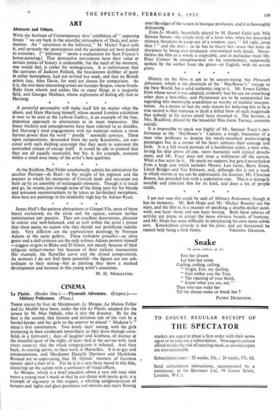CINEMA
Le Plaisir. (Studio One.)—Plymouth Adventure. (Empire.)— Military Policemen. (Plaza.)
THREE stories by Guy de Maupassant, Le Masque, La Maison Tellier and Le Modele have been, under the title Le Plaisir, adapted for the screen by M. Max Ophuls, who is also the director. By far the best is the second, that famous and delicious tale of the visit by a bordel-keeper and her girls to the country to attend " Madame's " niece's first communion. Two lovely days' outing, with the girls twittering in their exuberant town-finery as they drive through corn- fields in a farm-cart ; days of laughter and kindness, of dismay at the dreadful quiet of the night, of tears shed at the service with such sweet sincerity that the whole congregation is infected. And then back, in rousing spirits, to their work in Marseilles. It is so gay and compassionate, and Mesdames Danielle Darrieux and Madeleine Renaud are so captivating, that M. Ophuls' moment of fussiness cannot spoil a foot of it. For he is in a very fussy mood in this film, cluttering up the action with a confusion of visual effects. Le Masque, which is a brief anecdote about a very .old man who wears a young man's mask so that he can dance with pretty girls, is a triumph of ingenuity in this respect, a whirling conglomeration of dancers and lights and glass partitions and mirrors and stairs flowing
over the edges of the screen in baroque profusion, and it is thoroughly distracting.
Even Le Modele, beautifully played by M. Daniel Gclin and Mlle Simone Simon—the simple story of a lover who, when his discarded mistress threatens to jump out of a window, says, " All right, jump then ! " and she does ; so he has to marry her—even this loses its sharpness by being over-produced, overstocked with detail. Never- theless the film as a whole is enjoyable, and in particular must Mr. Peter Ustinov be complimented on his commentary, supposedly spoken by the author from the grave—in English, with an accent grave.
History on the films is apt to be unconvincing, but Plymouth Adventure, which is the chronicle of the ' Mayflower's ' voyage to the New World, has a solid authentic ring to it. Mr. Ernest Gebler, from whose novel it was adapted, evidently had his eye on something other than a box-office, and Paramount are to be commended for regarding this memorable expedition as worthy of truthful interpre- tation. As a matter of fact my only reason for believing this to be a true record is that romance is dealt a lethal blow of such magnitude that nobody in his senses could have invented it. The heroine, a Mrs. Bradford, played by the beautiful Miss Gene Tierney, commits suicide.
It is impossible to speak too highly of Mr. Spencer Tracy's per- formance as the Mayflower's ' Captain, a tough, buccaneer of a man who professes to despise his mealy-mquthed psalm-singing passengers but in a corner of his heart admires their courage and faith. It is a full round portrait of a hardbitten sailor, a man who, loving his ship above all else, views humanity with cynical detach- ment, and Mr. Tracy does not stray a millimetre off the canvas. What a fine actor he is. He needs no support, but gets it nevertheless from a large cast which includes Messrs. Leo Genn, Barry Jones, Lloyd Bridges and Van Johnson, and, although this is not a week in which storms at sea can be appreciated, his director, Mr. Clarence Brown, has provided him with a superlative one. This is a strangely sensible and coherent film for its kind, and does a lot of people credit.
• • •
I am not sure this could be said of Military Policemen, though it has its moments. Mr. Bob Hope and Mr. Mickey Rooney are the stars, and the film is, in a manner of speaking, a double-decker sand- wich, one layer Army and one layer boxing. Both these spheres of activity are prone to attract the more obvious brands of humour, and Mr. Hope has some difficulty in introducing his own more subtle „sort. Knockabout comedy is not his forte, and yet horizontal he


































 Previous page
Previous page